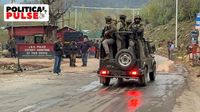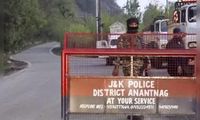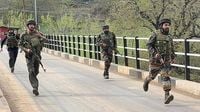In a tragic turn of events, a terrorist attack in the Baisaran Valley area of Pahalgam, located in the Anantnag district of Jammu and Kashmir, left at least 26 people dead, most of whom were tourists. The attack occurred on Tuesday, April 22, 2025, when militants opened fire on a group of tourists enjoying the picturesque scenery of the meadow. Among the victims was N Ramachandran, a native of Kochi, who was gunned down in front of his daughter and grandsons, highlighting the personal tragedies intertwined with this horrific incident.
The Resistance Front (TRF), a shadow group linked to the banned Pakistan-based Lashkar-e-Taiba (LeT), claimed responsibility for the attack. This group, which emerged as a proxy for LeT after the abrogation of Article 370 in August 2019, has been involved in various terrorist activities, including recruitment and propaganda. The Ministry of Home Affairs (MHA) designated TRF as a terrorist organization under the Unlawful Activities (Prevention) Act in January 2023, citing its role in inciting violence and recruiting youth for terrorist activities.
Security agencies have identified TRF commander Saifullah Kasuri, also known as Khalid, along with two Rawalkot-based LeT commanders as the main plotters behind the Pahalgam attack. Preliminary investigations suggest that at least four terrorists were involved, with three potentially being foreign nationals. Intelligence officials indicated that a local terrorist may have acted as a guide during the operation.
In response to the attack, the Indian Army, Jammu and Kashmir Police, and Central Reserve Police Force (CRPF) have cordoned off the area and increased security measures. A team from the National Investigation Agency (NIA) has arrived in Srinagar to further investigate the attack and gather evidence. The police have also sought information from telecommunications companies regarding mobile numbers active in the area at the time of the incident.
The attack has drawn widespread condemnation from political leaders both in India and abroad. Vivek Ramaswamy, an American entrepreneur and Republican politician, expressed his condolences, stating, "This was a horrific attack. We extend our condolences to the families of those who died and our prayers for those who were injured to recover quickly." Similarly, Ro Khanna, representing California's 17th congressional district, condemned the violence, saying, "I strongly condemn the horrific terrorist attack in Pahalgam, India. The gunman killed at least two dozen tourists at this beautiful sightseeing town. I stand with the people of India at this moment, and offer condolences and prayers to the families of the victims."
Other Indian-American leaders, including Ami Bera and Raja Krishnamoorthi, also voiced their shock and solidarity with the victims' families. Bera remarked, "I am greatly disturbed by the terrorist attack in Jammu and Kashmir that killed at least 20 civilians and injured dozens more," while Krishnamoorthi stated, "I am heartbroken by the horrific attack on innocent tourists in Kashmir. My prayers are with the victims and their families as they mourn and grapple with this senseless violence."
The attack has not only shocked the nation but also raised concerns about the security situation in Jammu and Kashmir. Schools across the region were closed on April 23, 2025, to observe a day of mourning, and markets in Handwara and Kupwara shut down in protest against the violence. The incident has also prompted discussions about the need for enhanced cooperation between the United States and India in combating terrorism, as highlighted by US Congressman Shri Thanedar, who stated, "With Vice President Vance in India, this attack underscores the urgent need for stronger US-India cooperation to confront terrorism and pursue justice."
Pakistan's Defence Minister Khawaja Asif, however, denied any connection to the attack, labeling it as a result of home-grown unrest. He claimed that the situation in Kashmir was exacerbated by India's treatment of minorities and that the violence was a response to oppression. Asif stated, "These are home-grown, the people are asking for their rights. Hindutva forces are exploiting the people, repressing minorities and exploiting Christians and Buddhists. They are being killed, this is a revolution against that."
The Pahalgam attack has drawn parallels to past incidents of violence in the region, reminding locals of the 2000 Chatisingpora massacre, where 34 Sikhs were killed. As the investigation continues, security forces are on high alert, and the situation remains tense. The Indian Army has deployed helicopters for counter-terrorism operations, indicating the seriousness with which authorities are treating this incident.
As the community grapples with the aftermath of this tragedy, the need for effective measures to combat terrorism and ensure the safety of civilians has never been more urgent. The events in Pahalgam serve as a stark reminder of the ongoing challenges faced in maintaining peace and security in Jammu and Kashmir.








